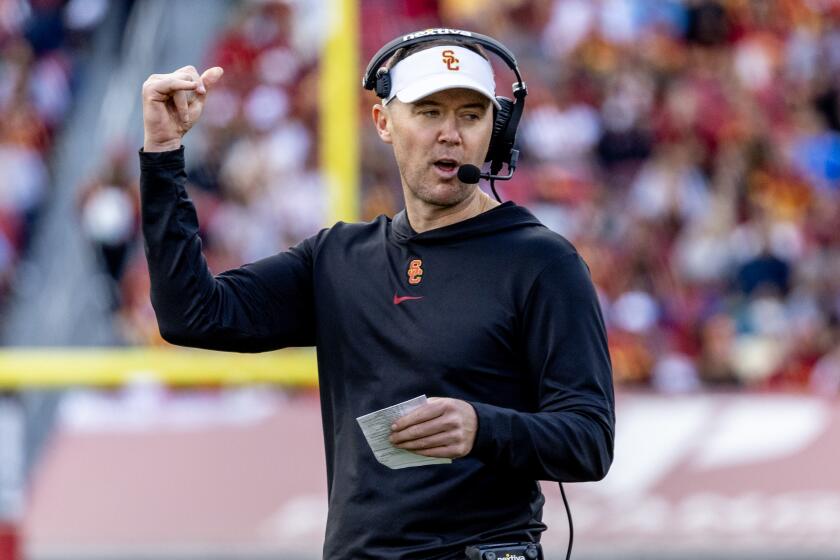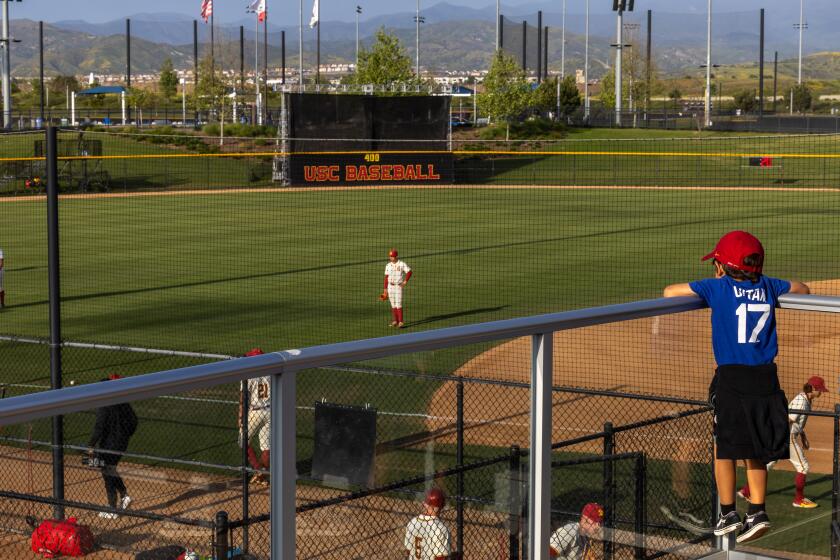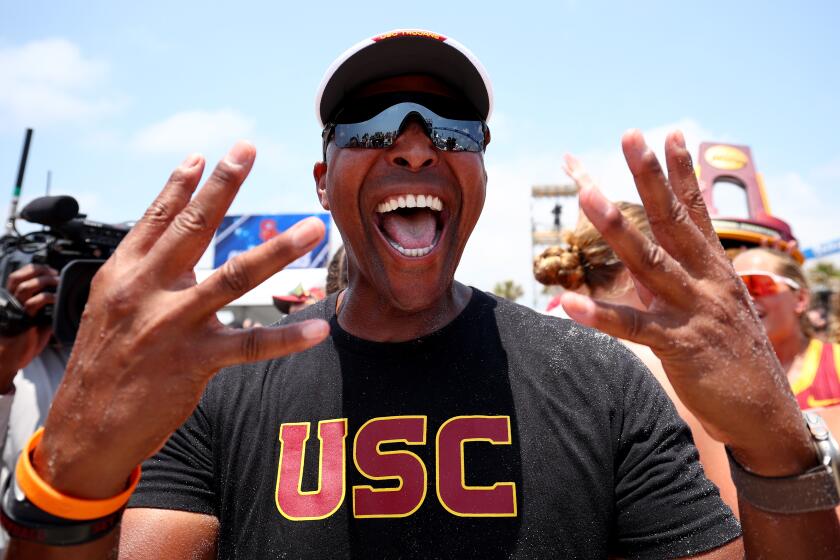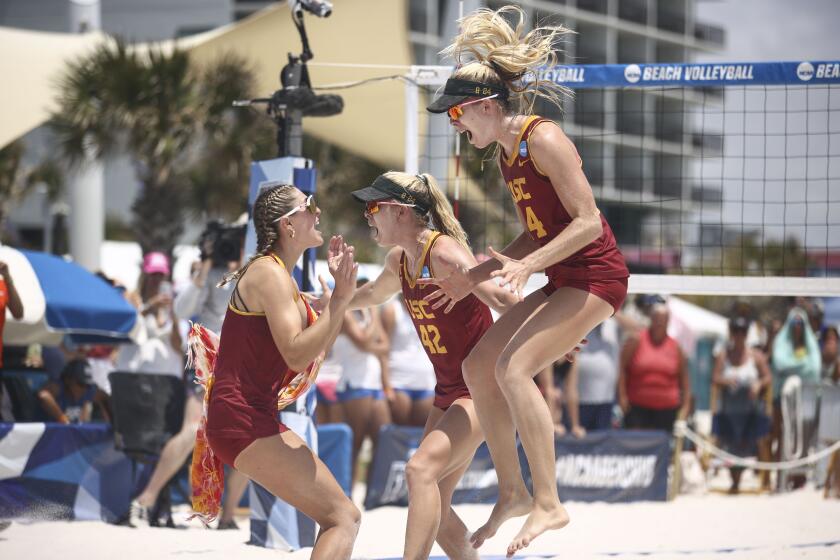He’s Heading South for the Spring : Buford Looks to Shine at USC After Playing in Shadows at Stanford
After spending two frustrating seasons as a seldom-used infielder at Stanford, Don Buford Jr. was beginning to feel like TV’s Bob Uecker, who sees his friends laughing inside his favorite sports tavern but can’t join them because they’ve locked him out.
Buford, 19, made just one appearance as a pinch-hitter this spring and was told by Coach Mark Marquess that he was not in the plans for the Cardinal infield.
The switch-hitting second baseman from Harvard High in Studio City decided it was time to move on.
Now at USC, Buford will attempt to crack the lineup next spring under the eye of his father, former major league outfielder Don Buford, a Trojan assistant coach.
In 10 major league seasons, Buford, a member of the 1958 USC team that won the NCAA championship, compiled a .264 lifetime average with the Chicago White Sox and the Baltimore Orioles. He was also a coach with the San Francisco Giants for three seasons.
Never one to push sports on his sons, Buford was nonetheless supportive of Don Jr.’s decision to transfer to USC.
“Coach Marquess told him he was going to move Ruben Amaro Jr. from third base to second base,” said Buford, who lives in Sherman Oaks. “I told Donny that if he felt like dedicating himself to trying, that he should transfer to where he might have an opportunity to play.”
Buford had the misfortune of joining a Cardinal team already overflowing with second basemen. There was incumbent second-team All-American Pete Stanicek and Amaro, a highly touted freshman from Penn Charter High in Philadelphia. He is the son of former major leaguer Ruben Amaro.
But Buford had credentials, too. He was a unanimous All-Pioneer League selection at Harvard, and attracted the attention of the Milwaukee Brewers.
According to Ray Poitevint, director of player procurement and scouting for the Brewers, Buford could have been drafted in the first through 10th rounds of the major league draft. If drafted, he would have been assigned to rookie league or Class A, depending on his development.
“We were interested in him in high school,” Poitevint said. “I knew that he was going to college and would build himself into a good pro prospect. He had a chance to be a pro player out of high school, but we knew his folks wanted him to go to college. If he’d been anyone else without college intentions, we would have drafted him.”
But how does a guy with professional potential coming out of high school get derailed when he reaches college?
Said Poitevint: “He got lost in the shuffle at Stanford. He played behind Stanicek, who would have been hard to replace at any school.”
Poitevint, formerly with the Baltimore Orioles organization, has signed a major leaguer or two in his time, including Orioles first baseman Eddie Murray and California Angels third baseman Doug DeCinces, both of Los Angeles.
Despite his lack of playing time over the past two years, Buford’s desire seems to have been revitalized over the summer. Much of his new outlook can be attributed to his season with the Pasadena Redbirds of the W. A. Goodman Summer Collegiate League.
His steady summer play has gone a long way toward giving him the confidence he will need to become a regular on a highly competitive Trojan team. In 20 games with the Redbirds, Buford hit .325 with a homer, seven doubles and 15 steals.
The Redbirds (30-4) beat the Seattle Mariner Rookies recently for the league championship. The team was largely made up of local college players and former minor leaguers.
“I think Donny Buford is ready for baseball after this summer,” said Redbird Coach Ed Panick. “He had an outstanding season for us. He played good defense, hit well and had good speed on the bases. He has a good baseball attitude. If he gets his break, he’s going places.”
Although Stanford might already be heading for a distant place in Buford’s memory, he still remembers the disappointment of Palo Alto.
“Stanicek was a good, solid player,” said Buford, who strongly resembles his dad. “As well as I had played, I think he was pretty set.”
Stanicek, a career .314 hitter, batted .341 his senior year and was the Orioles’ eighth-round pick in the June draft. Amaro far exceeded Marquess’ expectations by hitting .307 his freshman season as the Stanford third baseman.
“We had a lot of good players that played well,” said Marquess, who skippered the Cardinal to a 47-15 season, a Pacific-10 Southern Division title and a College World Series appearance. “Donny had to compete against Stanicek and Amaro, and it was tough.”
The elder Buford said coaching his son will be no different than handling any other young talent.
“A lot of coaches don’t like coaching their own sons,” Buford said. “I talk baseball to him just like I do to any other college player and express the same type of things. I also tell him that he’s got to work twice as hard, because he’s not going to be given any job or opportunity over what someone else might be given.”
Buford said his son won’t make baseball mistakes--those miscues stemming from not knowing how to play. He says that comes from his son having been around the game for so many years and getting hands-on advice from major leaguers at his position.
“When I was coaching with the Giants, I had him talk to Joe Morgan and Manny Trillo, getting their knowledge,” Buford said. “He would talk to them about making the double play and then he watched them make it. He watched their foot and hand action. Defensively, I don’t worry about him. If he hits at all, he’s going to be all right. He has all the other attributes.”
USC Coach Rod Dedeaux certainly can identify with the Buford father-son situation. Dedeaux’s two boys, Justin and Terry, played for him in the 1960s.
Dedeaux is excited over the prospect of coaching Buford.
“His dad was one of my real pride and joys, and if Don has the same desire that his daddy has, nothing is going keep him down,” said Dedeaux, who has coached at USC for 43 years.
Dedeaux finds it hard, however, to assess Buford’s talent, having seen him play only during practice. But because the Trojans lack depth, Dedeaux says Buford will have a legitimate shot at making it.
“He’ll have plenty of opportunities because we’re real thin in the infield,” Dedeaux said.
“Speed is his biggest offensive asset right now. He’s getting stronger. You wouldn’t project him to be a power hitter by any means, but he’s going to get the bat on the ball. And with his speed, he could come along. . . . He could be a late bloomer.”
If Buford doesn’t already have enough to do, he’ll be majoring in pre-med and economics when he begins school next month.
“I’m almost done with all my pre-med stuff,” Buford said. “I don’t know how it is at USC, but we practiced four hours a day at Stanford. Studying and playing baseball has never been a problem with me.”
If Buford gets enough playing time, he might get a chance to play major league ball like his father. Naturally, he’s pondered the thought.
“Some of my earliest memories are baseball,” Buford said. “Like the 1970 World Series, being there with my mom and brother. When (dad) played in Japan (for the Fukuoka Lions in 1976), I was older and so I understood much more about what was going on.
“That’s always been a goal set in the back of my mind. I think if I keep improving year by year that the majors are within reach.”
Go beyond the scoreboard
Get the latest on L.A.'s teams in the daily Sports Report newsletter.
You may occasionally receive promotional content from the Los Angeles Times.



